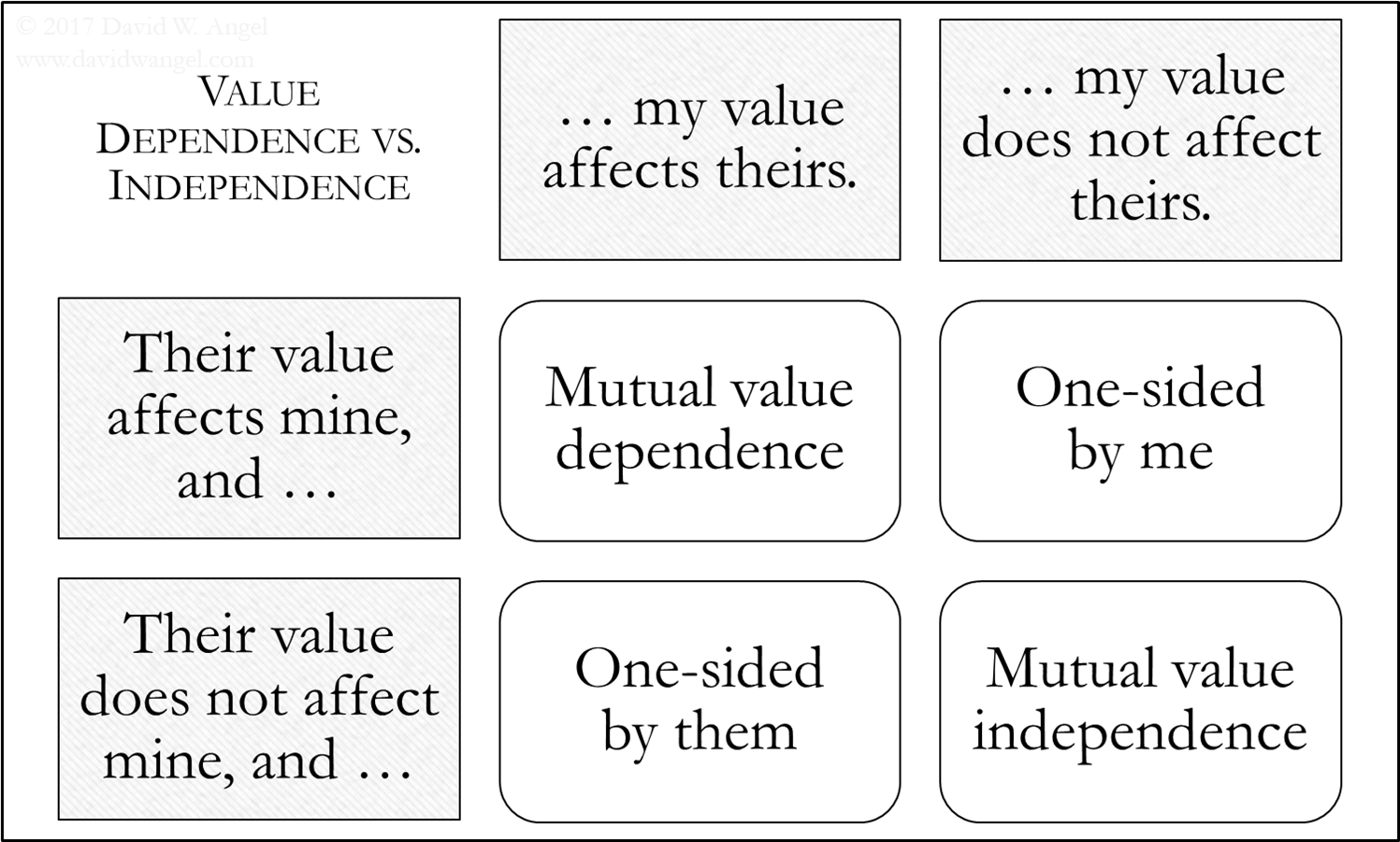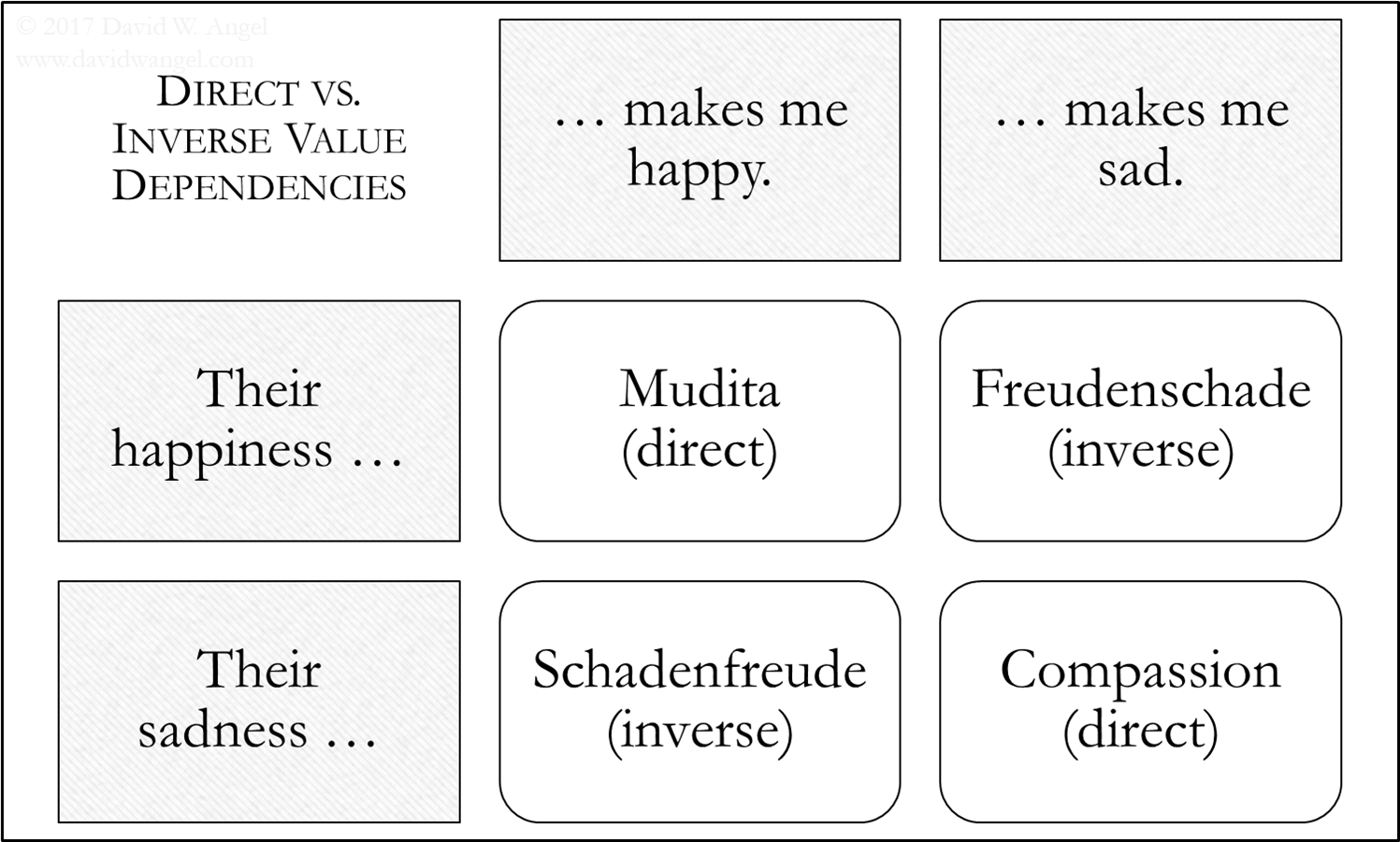Tragedy & Comedy Masks, Hadiran's Villa mosaic, 2nd century CE.
Value dependency is about how another person’s value from conflict affects your own value. Whether another person gains or loses value from a conflict can also cause us to gain or lose value as well. Plainly put, whether something makes another person happy or sad, can also make us happy or sad. The degree to which that happens determines the value dependency of a conflict. Value dependency can be examined by 1) the degree to which individual parties are value dependent, and 2) whether that value dependency is direct or inverse.
Degrees of Value Dependence
The greater your conflict’s value dependence, the more your value from that conflict is affected by whether others in that conflict gain or lose value. When your outcome has no value dependency – is value independent – then your value from that conflict is not affected by whether others gain or lose value. Furthermore, your value dependence (or independence), is not necessarily reciprocated by others in that conflict. A conflict can have mutual value dependence, mutual value independence, or one-sided value dependence:
Direct vs. Inverse
We can also characterize value dependency as being either direct or inverse, and there are four types of value dependencies in total (two direct and two inverse). The two direct value dependencies are mudita (you gain value when another gains value), and compassion (you lose value when another loses value). The two inverse value dependencies are schadenfreude (you gain value when another loses value), and freudenschade (you lose value when another gains value). Here is what these types of value dependencies look like using “happiness” for gaining value, and “sadness” for losing value:
Furthermore, it is possible to hold multiple types of value dependencies towards the same person in the same conflict. And, just as with being value dependent versus independent, the type(s) of value dependency that you experience does not mean that others must experience the same type(s) of value dependency as well.
For example, imagine an office scenario where one employee, Aye, feels freudenschade towards another employee, Bee. However, Bee feels compassion towards Aye. Bee ends up getting a promotion, and is immensely happy. But, because of Bee’s good news, Aye is displeased by Bee’s happiness. Bee notices this, and Aye’s sadness causes Bee to feel some sadness as well. Now, this isn’t enough to discourage Bee from still being happy, but the overall value for Bee is lessened. And, because Aye was also made unhappy, the total value for both together is less than if both were value independent, which is also less than if both had experienced mudita.
However, what if Bee also felt schadenfreude towards Aye? This might seem like a conflict of value dependencies, but what if Aye acted like a jerk towards Bee? Bee’s initial sadness at upsetting Aye might be offset by Bee’s secondary reaction of happiness at having done so as well. Although this sounds contradictory, consider how often people temper their responses with “I know I shouldn’t be happy about this, but….” Or, “I feel kind of bad for them, but they sort of deserved it.” Because conflict can be complex, so too can our value dependencies.
The Moral Value of Value Dependency
Being value dependent or independent, and the types of value dependencies one experiences, are not, on their own, good or bad. That is something for the individuals involved to determine, and can vary significantly from conflict to conflict. Keep in mind that when it comes to value dependency, you must take into consideration how it affects you, and those in your conflict. And, just because people are not immediately involved in your conflict, it doesn’t mean that your actions won’t indirectly affect others as well.
Matching Value Dependency to Behavior
Remember, value dependency is about how another person’s value from conflict affects your own value. Value dependency is not the same thing as behavior, although behavior can affect value as well. Behavior is about the actions you take, within the circumstances of your conflict, to achieve outcomes that are aligned with your values. Your behavior should serve your values, not the other way around. (I’ll be writing more about behavior in conflict in an upcoming article.)
So, the next time you are in a conflict, ask: “how does value dependency affect my goals, and is what I am doing serving those goals?”
Enjoy this article? Want to share your thoughts? Don’t forget to like, comment, or share before you leave. For more, check out davidwangel.com


